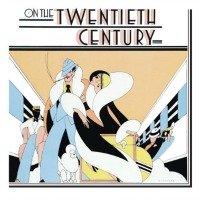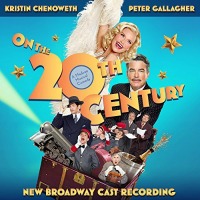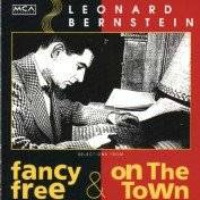 Original Broadway Cast Members, 1944 (Decca/MCA)
Original Broadway Cast Members, 1944 (Decca/MCA)  (2 / 5) Record companies treated Broadway musicals pretty poorly until the concept of the original cast album became firmly entrenched, so this collection is mainly of interest for its historical value. Rather than issuing an integral recording of the Leonard Bernstein-Betty Comden-Adolph Green musical On the Town, which was certainly a big hit, Decca produced 78rpms of Nancy Walker doing her solo “I Can Cook, Too” and performing the quartet “Ya Got Me” as another solo; Comden and Green in their duet “Carried Away”; the Lyn Murray Chorus in the show’s opening sequence (including “I Feel Like I’m Not Out of Bed Yet” and “New York, New York,” but with no dialogue); and Mary Martin crooning the two ballads that were sung in the show by John Battles as Gabey, “Lucky to Be Me” and “Lonely Town.” All of these recordings, plus an extended version of the opening sequence, are included on the 1991 MCA CD, along with selections from Fancy Free (the Jerome Robbins ballet that inspired On the Town) as performed by the Ballet Theatre Orchestra under the direction of composer Bernstein. — Jeffrey Dunn
(2 / 5) Record companies treated Broadway musicals pretty poorly until the concept of the original cast album became firmly entrenched, so this collection is mainly of interest for its historical value. Rather than issuing an integral recording of the Leonard Bernstein-Betty Comden-Adolph Green musical On the Town, which was certainly a big hit, Decca produced 78rpms of Nancy Walker doing her solo “I Can Cook, Too” and performing the quartet “Ya Got Me” as another solo; Comden and Green in their duet “Carried Away”; the Lyn Murray Chorus in the show’s opening sequence (including “I Feel Like I’m Not Out of Bed Yet” and “New York, New York,” but with no dialogue); and Mary Martin crooning the two ballads that were sung in the show by John Battles as Gabey, “Lucky to Be Me” and “Lonely Town.” All of these recordings, plus an extended version of the opening sequence, are included on the 1991 MCA CD, along with selections from Fancy Free (the Jerome Robbins ballet that inspired On the Town) as performed by the Ballet Theatre Orchestra under the direction of composer Bernstein. — Jeffrey Dunn
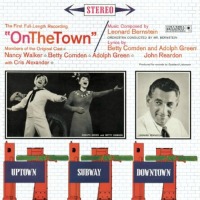 Studio Recording With Original Cast Members, 1960 (Columbia/Sony)
Studio Recording With Original Cast Members, 1960 (Columbia/Sony)  (5 / 5) In 1960, legendary cast-album producer Goddard Lieberson reassembled most of the original On the Town principals and brought them into a studio to record virtually the entire score with Leonard Bernstein conducting. Nancy Walker, Cris Alexander, Betty Comden, and Adolph Green were all present, and the excellent John Reardon joined them as Gabey. Two songs missing from the first LP release of this album, the female chorus number “Do Do Re Do” and Pitkin’s “I Understand,” sung by George Gaynes, were restored for the Sony CD. The performances are so fresh that the recording sounds as if it were made right after the show opened on Broadway; Bernstein’s conducting is sensational in all of the ballet music and in the wonderful songs, too. Walker and Alexander are perfect in “Come Up to My Place,” as are Comden and Green in “Carried Away,” while Reardon lends his warm, clear baritone to “Lonely Town” and “Lucky to Be Me.” The choral work is fine, and we are even treated to Bernstein himself doing some singing as Rajah Bimmy in “The Real Coney Island” Ballet. An indispensable recording. — J.D.
(5 / 5) In 1960, legendary cast-album producer Goddard Lieberson reassembled most of the original On the Town principals and brought them into a studio to record virtually the entire score with Leonard Bernstein conducting. Nancy Walker, Cris Alexander, Betty Comden, and Adolph Green were all present, and the excellent John Reardon joined them as Gabey. Two songs missing from the first LP release of this album, the female chorus number “Do Do Re Do” and Pitkin’s “I Understand,” sung by George Gaynes, were restored for the Sony CD. The performances are so fresh that the recording sounds as if it were made right after the show opened on Broadway; Bernstein’s conducting is sensational in all of the ballet music and in the wonderful songs, too. Walker and Alexander are perfect in “Come Up to My Place,” as are Comden and Green in “Carried Away,” while Reardon lends his warm, clear baritone to “Lonely Town” and “Lucky to Be Me.” The choral work is fine, and we are even treated to Bernstein himself doing some singing as Rajah Bimmy in “The Real Coney Island” Ballet. An indispensable recording. — J.D.
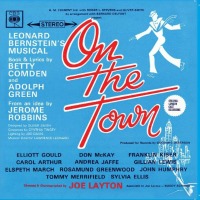 Original London Cast, 1963 (CBS/Masterworks Broadway)
Original London Cast, 1963 (CBS/Masterworks Broadway)  (2 / 5) The first London production of On the Town was based on a critically acclaimed but unsuccessful Off-Broadway production; the principals of that staging were imported for the occasion, but the London edition also failed to become a hit. An LP was released and quickly became a collectors’ item. The three male leads are much better than the rest of the cast: Don McKay is an excellent Gabey, Elliott Gould is a funny, underplayed Chip, and Terry Kiser is quite good as Ozzie. Less successful are Carol Arthur as Hildy and Gillian Lewis as Claire. The album includes the show’s rarely recorded overture, but almost all of the ballet music is abridged. Though the performance is well conducted by Lawrence Leonard, this recording is not a necessity. — J.D.
(2 / 5) The first London production of On the Town was based on a critically acclaimed but unsuccessful Off-Broadway production; the principals of that staging were imported for the occasion, but the London edition also failed to become a hit. An LP was released and quickly became a collectors’ item. The three male leads are much better than the rest of the cast: Don McKay is an excellent Gabey, Elliott Gould is a funny, underplayed Chip, and Terry Kiser is quite good as Ozzie. Less successful are Carol Arthur as Hildy and Gillian Lewis as Claire. The album includes the show’s rarely recorded overture, but almost all of the ballet music is abridged. Though the performance is well conducted by Lawrence Leonard, this recording is not a necessity. — J.D.
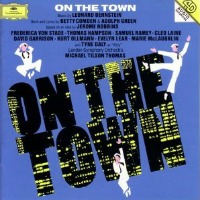 London Concert Cast, 1992 (DG)
London Concert Cast, 1992 (DG)  (4 / 5) On the Town in concert, with an all-star cast from the worlds of Broadway and opera plus Michael Tilson Thomas conducting the London Symphony Orchestra, sounds like a great idea-and, indeed, it was. The orchestra is magnificent and the live-performance energy of the cast is palpable. Tyne Daly is tops as the tough Hildy, especially in “I Can Cook, Too.” As Claire and Chip, Frederica von Stade and Kurt Ollman prove themselves to be opera singers who can successfully “cross over” to Broadway. When respectively paired with them in the comic duets “Carried Away” and “Come Up to My Place,” musical theater veterans David Garrison (who plays Ozzie) and Daly blend with ease; and when these four team up for the rueful “Some Other Time,” any barriers between Broadway and classical music are broken. Thomas Hampson uses his creamy baritone well in Gabey’s songs; Evelyn Lear is very fine as Mme. Dilly; and basso Samuel Ramey’s “I Understand” is impressive. Included are two previously cut songs: “Gabey’s Comin'” (“Pickup Song”) introduces tunes subsequently used as leitmotifs in the score, and its importance as a missing link is explained in the first-rate CD booklet notes written by Ethan Mordden. Cleo Laine sings the second restored song, “Ain’t Got No Tears left,” and Adolph Green makes a cameo appearance as Rajah Bimmy in “The Real Coney Island” ballet. As an appendix, we get yet another cut song, “The Intermission’s Great.” — J.D.
(4 / 5) On the Town in concert, with an all-star cast from the worlds of Broadway and opera plus Michael Tilson Thomas conducting the London Symphony Orchestra, sounds like a great idea-and, indeed, it was. The orchestra is magnificent and the live-performance energy of the cast is palpable. Tyne Daly is tops as the tough Hildy, especially in “I Can Cook, Too.” As Claire and Chip, Frederica von Stade and Kurt Ollman prove themselves to be opera singers who can successfully “cross over” to Broadway. When respectively paired with them in the comic duets “Carried Away” and “Come Up to My Place,” musical theater veterans David Garrison (who plays Ozzie) and Daly blend with ease; and when these four team up for the rueful “Some Other Time,” any barriers between Broadway and classical music are broken. Thomas Hampson uses his creamy baritone well in Gabey’s songs; Evelyn Lear is very fine as Mme. Dilly; and basso Samuel Ramey’s “I Understand” is impressive. Included are two previously cut songs: “Gabey’s Comin'” (“Pickup Song”) introduces tunes subsequently used as leitmotifs in the score, and its importance as a missing link is explained in the first-rate CD booklet notes written by Ethan Mordden. Cleo Laine sings the second restored song, “Ain’t Got No Tears left,” and Adolph Green makes a cameo appearance as Rajah Bimmy in “The Real Coney Island” ballet. As an appendix, we get yet another cut song, “The Intermission’s Great.” — J.D.
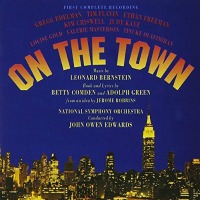 Studio Cast, 1996 (JAY, 2CDs)
Studio Cast, 1996 (JAY, 2CDs)  (3 / 5) This “First Complete Recording” of On the Town boasts a commitment to character truth that deeply engages the listener; the five singing principals are exactly right from a vocal standpoint, and they illuminate the material. As Gabey, Ethan Freeman is vulnerable in “Lonely Town” (the previously unrecorded chorale section of the song after the “Pas de Deux” is haunting), and his “Lucky to Be Me” is exuberant. Gregg Edelman and Kim Criswell deliver the goods in “Come Up to My Place,” and Criswell raises the roof with “I Can Cook, Too,” complete with encore. Tim Flavin and Judy Kaye, in the roles that Betty Comden and Adolph Green wrote for themselves to play in 1944, are solid in “Carried Away.” The two couples raise their voices joyously when cheering up Gabey in “Ya Got Me” and heartbreakingly when they prepare to part in the melancholic “Some Other Time.” The ballet music is complete and excitingly conducted by John Owen Edwards — as are the overture, the entr’acte, the exit music, the amusing nightclub sequence, and even the deleted “Gabey’s Comin’.” — J.D.
(3 / 5) This “First Complete Recording” of On the Town boasts a commitment to character truth that deeply engages the listener; the five singing principals are exactly right from a vocal standpoint, and they illuminate the material. As Gabey, Ethan Freeman is vulnerable in “Lonely Town” (the previously unrecorded chorale section of the song after the “Pas de Deux” is haunting), and his “Lucky to Be Me” is exuberant. Gregg Edelman and Kim Criswell deliver the goods in “Come Up to My Place,” and Criswell raises the roof with “I Can Cook, Too,” complete with encore. Tim Flavin and Judy Kaye, in the roles that Betty Comden and Adolph Green wrote for themselves to play in 1944, are solid in “Carried Away.” The two couples raise their voices joyously when cheering up Gabey in “Ya Got Me” and heartbreakingly when they prepare to part in the melancholic “Some Other Time.” The ballet music is complete and excitingly conducted by John Owen Edwards — as are the overture, the entr’acte, the exit music, the amusing nightclub sequence, and even the deleted “Gabey’s Comin’.” — J.D.
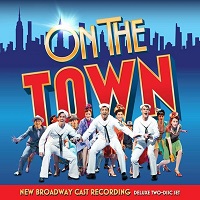 Broadway Cast, 2015 (PS Classics, 2CDs)
Broadway Cast, 2015 (PS Classics, 2CDs)  (4 / 5) Here’s a wonderful cast recording of an excellent, loving revival of On the Town that opened on Broadway in the fall of 2014 to mark the show’s 70th anniversary year. The score is presented note-complete with the peerless original orchestrations and in superb, state-of-the-art digital sound, with James Moore expertly conducting a gratifyingly full orchestra. Clyde Alves, Jay Armstrong Johnson, and Tony Yazbeck exude charm and burst with energy in the roles of Ozzie, Chip, and Gabey respectively; Yazbeck’s performance deserves an extra star for his truly gorgeous singing voice. (Alas, his equally gorgeous dancing in this production could not be preserved on an audio-only recording, nor could that of Megan Fairchild as Ivy Smith.) Alysha Umphress as Hildy makes a meal of “I Can Cook, Too” and is a hilarious partner for Johnson in “Come Up to My Place.” Aside from some overacting in “Carried Away,” Elizabeth Stanley is a delightful Claire de Loon, and she sings beautifully and movingly in “Some Other Time,” as do the other leads. Michael Rupert is amusing as Pitkin, the “understanding” fellow whom Claire throws over when she meets Ozzie; Jackie Hoffman shows off her well-honed comic chops as Mme. Dilly in “Do Do Re Do”; and Phillip Boykin displays his sonorous bass-baritone as the Workman who opens the show with “I feel like I’m not out of bed yet” and as the Miss Turnstiles announcer, among other roles. — Michael Portantiere
(4 / 5) Here’s a wonderful cast recording of an excellent, loving revival of On the Town that opened on Broadway in the fall of 2014 to mark the show’s 70th anniversary year. The score is presented note-complete with the peerless original orchestrations and in superb, state-of-the-art digital sound, with James Moore expertly conducting a gratifyingly full orchestra. Clyde Alves, Jay Armstrong Johnson, and Tony Yazbeck exude charm and burst with energy in the roles of Ozzie, Chip, and Gabey respectively; Yazbeck’s performance deserves an extra star for his truly gorgeous singing voice. (Alas, his equally gorgeous dancing in this production could not be preserved on an audio-only recording, nor could that of Megan Fairchild as Ivy Smith.) Alysha Umphress as Hildy makes a meal of “I Can Cook, Too” and is a hilarious partner for Johnson in “Come Up to My Place.” Aside from some overacting in “Carried Away,” Elizabeth Stanley is a delightful Claire de Loon, and she sings beautifully and movingly in “Some Other Time,” as do the other leads. Michael Rupert is amusing as Pitkin, the “understanding” fellow whom Claire throws over when she meets Ozzie; Jackie Hoffman shows off her well-honed comic chops as Mme. Dilly in “Do Do Re Do”; and Phillip Boykin displays his sonorous bass-baritone as the Workman who opens the show with “I feel like I’m not out of bed yet” and as the Miss Turnstiles announcer, among other roles. — Michael Portantiere
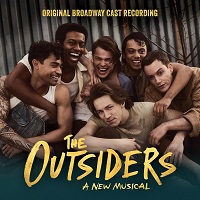 Original Broadway Cast, 2024 (Masterworks Broadway)
Original Broadway Cast, 2024 (Masterworks Broadway)  (3 / 5) The Outsiders followed the popular book-to-movie-to-musical path and arrived on Broadway in 2024. It started out as a novel written by teenage author S.E. Hinton, published in 1967, about two rival groups of teenagers separated by social status — the lower class greasers and the upper class “Socs.” The novel quickly became a staple for high school reading and was further ingrained in American culture via the 1983 Francis Ford Coppola film, with a cast of future stars including Tom Cruise and Rob Lowe. The musical retains much of the novel’s heavy plot and all of its earnestness, with songs by Broadway newcomers Jonathan Clay, Zach Chance, and Justine Levine. While the score pulsates with folk rhythms and country melodies, many of the lyrics are less than adept — for example, “It’s hard to write the story when the story’s writing me,” “It’s Friday night and it feels so right.” The novel was written in the first-person perspective, and the musical’s creators have not found a fully satisfactory way of balancing the exposition from the source material with the necessary dramatic elements required to tell the story on stage and through song. The main protagonist, a 14-year-old named Ponyboy Curtis (played and sung with sensitivity by Brody Grant), is a member of the greasers gang along with Johnny Cade (Sky Lakota Lynch), Sodapop (Jason Schmidt), Dally (Joshua Boone), and Ponyboy’s older brother, Darrel (Brent Comer). Despite violent confrontations between the rival gangs, Ponyboy makes a connection with one of the “Soc” girls, Cherry Valance (Emma Pittman). Refreshingly, though, the show avoids a Romeo and Juliet-like romantic storyline by focusing on the fraternal relationships among the greasers. In addition to the first few numbers being loaded down by exposition delivered directly to the audience, the score sometimes leans towards melodrama (for example, “Death’s at My Door” and “Throwing in the Towel”). But happily, when the conflict between the two gangs escalates, The Outsiders finds its footing and amps up the excitement in songs such as “Justice for Tulsa” and “Trouble.” The Dally character gets two stellar musical moments, the jazzy “Little Brother” and “Run Run Brother,” while the 11 o’clock number, “Stay Gold,” sung by Ponyboy and Johnny Cade, has the show’s most endearing melody, despite a distracting amount of reverb on this recording. All of the songs are aided mightily by Justine Levine’s fantastic orchestrations. — Forrest Hutchison
(3 / 5) The Outsiders followed the popular book-to-movie-to-musical path and arrived on Broadway in 2024. It started out as a novel written by teenage author S.E. Hinton, published in 1967, about two rival groups of teenagers separated by social status — the lower class greasers and the upper class “Socs.” The novel quickly became a staple for high school reading and was further ingrained in American culture via the 1983 Francis Ford Coppola film, with a cast of future stars including Tom Cruise and Rob Lowe. The musical retains much of the novel’s heavy plot and all of its earnestness, with songs by Broadway newcomers Jonathan Clay, Zach Chance, and Justine Levine. While the score pulsates with folk rhythms and country melodies, many of the lyrics are less than adept — for example, “It’s hard to write the story when the story’s writing me,” “It’s Friday night and it feels so right.” The novel was written in the first-person perspective, and the musical’s creators have not found a fully satisfactory way of balancing the exposition from the source material with the necessary dramatic elements required to tell the story on stage and through song. The main protagonist, a 14-year-old named Ponyboy Curtis (played and sung with sensitivity by Brody Grant), is a member of the greasers gang along with Johnny Cade (Sky Lakota Lynch), Sodapop (Jason Schmidt), Dally (Joshua Boone), and Ponyboy’s older brother, Darrel (Brent Comer). Despite violent confrontations between the rival gangs, Ponyboy makes a connection with one of the “Soc” girls, Cherry Valance (Emma Pittman). Refreshingly, though, the show avoids a Romeo and Juliet-like romantic storyline by focusing on the fraternal relationships among the greasers. In addition to the first few numbers being loaded down by exposition delivered directly to the audience, the score sometimes leans towards melodrama (for example, “Death’s at My Door” and “Throwing in the Towel”). But happily, when the conflict between the two gangs escalates, The Outsiders finds its footing and amps up the excitement in songs such as “Justice for Tulsa” and “Trouble.” The Dally character gets two stellar musical moments, the jazzy “Little Brother” and “Run Run Brother,” while the 11 o’clock number, “Stay Gold,” sung by Ponyboy and Johnny Cade, has the show’s most endearing melody, despite a distracting amount of reverb on this recording. All of the songs are aided mightily by Justine Levine’s fantastic orchestrations. — Forrest Hutchison

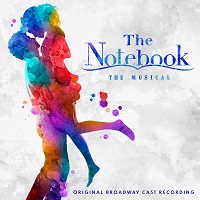
 (3.5 / 5) The Notebook wears its heart on its sleeve. And why wouldn’t it? From Nicholas Sparks’ novel to Nick Cassavetes’ film to Ingrid Michaelson’s Broadway musical, the story of Noah, a boy from the wrong side of the tracks, and rich girl Allison, who fall in love as teenagers and stay in love for the rest of their lives, has touched people all over the world. The question presented by this cast album is: How many earnest pop ballads about love can fit in one musical? And the answer is, a surprising amount. Michaelson’s music is lush and catchy, and only in the latter part of the score does it begin to feel repetitive. Her lyrics, written more in the pop vein, often deal in false rhymes (“time/mine,” “coin/joy,” etc.), and in doing so, they don’t quite give the ear what it wants. These lyrics also lack some of the specificity that musical theater requires. But where the score comes up short, the wonderful performances of the six leading cast members who play Noah and Allie at three different stages of their lives make up for it. John Cardoza as Young Noah has an especially delightful, buttery voice that lends itself perfectly to Michaelson’s musical style, and the gruff sound of Dorian Harewood as Older Noah provides an excellent contrast to the expansive vocal quality of the four younger performers. One of the album’s greatest losses is Maryann Plunkett’s full performance as Older Allie. Since her character has dementia for the duration of the show, the authors choose not to have her sing until the finale. When Plunkett does sing, and also when she delivers the snippets of dialogue that are included on the recording along the way, she infuses the character with reality, fire, and beauty. Happily, there are plenty of delights even in her absence. If pop artists were still covering songs from musicals, a few numbers in this score could easily be stand-alone hits: “I’ll Leave the Light On,” Middle Noah’s tribute to the lover he’s gone too long without seeing, is deliciously mournful, and “If This Is Love,” Younger Allie’s account of her feelings towards Noah, is an innocent delight. But The Notebook is strongest as a musical theater recording, rather than a pop album, when it deals with more serious topics; “I Want to Go Back,” in which Younger and Middle Allie voice the frustrations of their older counterpart about being forced to stay in a hospital, is likely to give the listener goosebumps with its soaring melody and plaintive lyrics: “Is it time for dinner? / Is it time for forever?” Indeed, any time Noah and Allie sing in harmony across the generations, it’s immensely satisfying to the ear, their voices blending beautifully and hauntingly. These moments of intergenerational connection could’ve been less frequent in order to maximize their impact, but the listener will be grateful for the aural riches that are present.
(3.5 / 5) The Notebook wears its heart on its sleeve. And why wouldn’t it? From Nicholas Sparks’ novel to Nick Cassavetes’ film to Ingrid Michaelson’s Broadway musical, the story of Noah, a boy from the wrong side of the tracks, and rich girl Allison, who fall in love as teenagers and stay in love for the rest of their lives, has touched people all over the world. The question presented by this cast album is: How many earnest pop ballads about love can fit in one musical? And the answer is, a surprising amount. Michaelson’s music is lush and catchy, and only in the latter part of the score does it begin to feel repetitive. Her lyrics, written more in the pop vein, often deal in false rhymes (“time/mine,” “coin/joy,” etc.), and in doing so, they don’t quite give the ear what it wants. These lyrics also lack some of the specificity that musical theater requires. But where the score comes up short, the wonderful performances of the six leading cast members who play Noah and Allie at three different stages of their lives make up for it. John Cardoza as Young Noah has an especially delightful, buttery voice that lends itself perfectly to Michaelson’s musical style, and the gruff sound of Dorian Harewood as Older Noah provides an excellent contrast to the expansive vocal quality of the four younger performers. One of the album’s greatest losses is Maryann Plunkett’s full performance as Older Allie. Since her character has dementia for the duration of the show, the authors choose not to have her sing until the finale. When Plunkett does sing, and also when she delivers the snippets of dialogue that are included on the recording along the way, she infuses the character with reality, fire, and beauty. Happily, there are plenty of delights even in her absence. If pop artists were still covering songs from musicals, a few numbers in this score could easily be stand-alone hits: “I’ll Leave the Light On,” Middle Noah’s tribute to the lover he’s gone too long without seeing, is deliciously mournful, and “If This Is Love,” Younger Allie’s account of her feelings towards Noah, is an innocent delight. But The Notebook is strongest as a musical theater recording, rather than a pop album, when it deals with more serious topics; “I Want to Go Back,” in which Younger and Middle Allie voice the frustrations of their older counterpart about being forced to stay in a hospital, is likely to give the listener goosebumps with its soaring melody and plaintive lyrics: “Is it time for dinner? / Is it time for forever?” Indeed, any time Noah and Allie sing in harmony across the generations, it’s immensely satisfying to the ear, their voices blending beautifully and hauntingly. These moments of intergenerational connection could’ve been less frequent in order to maximize their impact, but the listener will be grateful for the aural riches that are present. 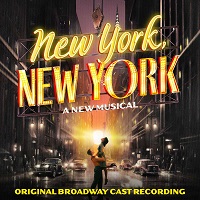
 (0.5 / 5) New York, New York is destined to go down in musical theater history books for its creative team, which includes the legendary composer John Kander as well as director/choreographer Susan Stroman and lyricist Lin Manuel Miranda, who spearheaded the two most Tony-nominated musicals of all time. Unfortunately, the show itself will be remembered as a colossal disappointment: Rather than a love letter to the city that doesn’t sleep, or even to the post-WW II era in which the action takes place, what we have here is a misguided mishmash of weaker items from the Kander & Ebb repertoire forced into a stage musical with the number of main and featured characters greatly expanded from the film on which it is very loosely based. The plot largely concerns the troubled romance between struggling musician Jimmy Doyle and struggling singer Francine Evans, but the creators seem to have determined that these characters weren’t interesting enough for an entire show. As a result, also on hand to clutter up the proceedings are an Hispanic immigrant and his abusive father and loving mother, a cleaning woman turned opera singer, a Jewish immigrant and his violin teacher, et al. “A Quell ‘Amor,” performed by the newly minted opera singer, is perhaps the nadir of the show; it makes no sense in or out of context, we never hear from its singer again, and the song’s title is 50% of its lyrics. Indeed, lyrics are not the primary concern of this production, as shown by the inclusion of six extended instrumental pieces titled “Morning in New York,” “New York in the Rain,” “New York in the Summer,” “New York in the Snow,” “New York at Night,” and “New York Concerto.” (Orchestrators Sam Davis and Daryl Waters have done an admirable job of creating a period feel and an excitement that’s lacking in the plot.) One of the oddest aspects of the show and this album is the fact that Colton Ryan, who portrays Jimmy Doyle, sings every song as if he were being strangled, emitting some of the ugliest vowel sounds ever heard. On the other hand, Anna Uzele as Francine raises the roof with her big numbers, but her acting is not quite at the level of her vocal ability. The only two pitch-perfect performances are from Emily Skinner, as the aforementioned violin teacher, and the sadly underused Clyde Alves, as the leading man’s best friend. Four demo recording are appended to this album, and in the tracks where you can hear Fred Ebb singing his own material, you start to understand what this show could’ve been if that great lyricist had lived longer: a unique, biting, entertaining final curtain call for Kander & Ebb. Instead, listeners may end up, to quote one of the show’s stronger songs, sorry they asked. — Charles Kirsch
(0.5 / 5) New York, New York is destined to go down in musical theater history books for its creative team, which includes the legendary composer John Kander as well as director/choreographer Susan Stroman and lyricist Lin Manuel Miranda, who spearheaded the two most Tony-nominated musicals of all time. Unfortunately, the show itself will be remembered as a colossal disappointment: Rather than a love letter to the city that doesn’t sleep, or even to the post-WW II era in which the action takes place, what we have here is a misguided mishmash of weaker items from the Kander & Ebb repertoire forced into a stage musical with the number of main and featured characters greatly expanded from the film on which it is very loosely based. The plot largely concerns the troubled romance between struggling musician Jimmy Doyle and struggling singer Francine Evans, but the creators seem to have determined that these characters weren’t interesting enough for an entire show. As a result, also on hand to clutter up the proceedings are an Hispanic immigrant and his abusive father and loving mother, a cleaning woman turned opera singer, a Jewish immigrant and his violin teacher, et al. “A Quell ‘Amor,” performed by the newly minted opera singer, is perhaps the nadir of the show; it makes no sense in or out of context, we never hear from its singer again, and the song’s title is 50% of its lyrics. Indeed, lyrics are not the primary concern of this production, as shown by the inclusion of six extended instrumental pieces titled “Morning in New York,” “New York in the Rain,” “New York in the Summer,” “New York in the Snow,” “New York at Night,” and “New York Concerto.” (Orchestrators Sam Davis and Daryl Waters have done an admirable job of creating a period feel and an excitement that’s lacking in the plot.) One of the oddest aspects of the show and this album is the fact that Colton Ryan, who portrays Jimmy Doyle, sings every song as if he were being strangled, emitting some of the ugliest vowel sounds ever heard. On the other hand, Anna Uzele as Francine raises the roof with her big numbers, but her acting is not quite at the level of her vocal ability. The only two pitch-perfect performances are from Emily Skinner, as the aforementioned violin teacher, and the sadly underused Clyde Alves, as the leading man’s best friend. Four demo recording are appended to this album, and in the tracks where you can hear Fred Ebb singing his own material, you start to understand what this show could’ve been if that great lyricist had lived longer: a unique, biting, entertaining final curtain call for Kander & Ebb. Instead, listeners may end up, to quote one of the show’s stronger songs, sorry they asked. — Charles Kirsch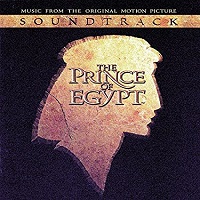
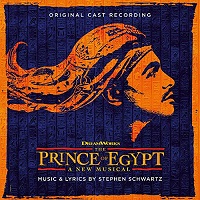
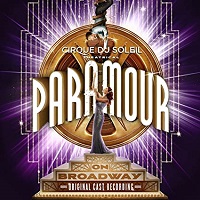
 (2 / 5) With its spectacular entertainments showcasing nouveau-circus acts of all types, accessorized with top-drawer production values and very listenable if somewhat bland music, Cirque du Soleil has experienced great success over the decades since the company’s birth in Quebec in 1984. But Cirque did not have a hit with its 2016 attempt to create a Broadway musical incorporating the sort of acts (aerialists, acrobats, etc.) and accoutrements for which it has become world famous. The show was called Paramour, or rather, Cirque du Soleil Paramour, and simply reading the credits is enough to give one pause. Believe it or not, no book writer is listed, with West Hyler acknowledged only for the “story” and as “scene director.” (So, who wrote the dialogue?) As for the score credits, here you go: music by Bob & Bill (????), co-composer Andreas Carlsson, assistant composer Martin Laniel, lyrics by Andreas Carlsson, additional lyrics by Jenny Stafford. The resulting mess of a show purported to tell a tale of “The Golden Age of Hollywood,” though there were countless anachronisms in the dialogue and only intermittent nods toward period authenticity in the score and the design elements. The plot, such as it is, has the megalomaniacal film director A.J. (Jeremy Kushnier) discovering a potential new movie star in nightclub chanteuse Indigo (Ruby Davis), leading to lots of clichéd goings-on while the audience waits to see if our heroine will eventually end up with her pianist/songwriter, Joey (Ryan Vona), the nice guy who adores her. Given this show’s pedigree and the fact that Cirque did not feel it necessary to hire anyone with traditional musical theater talent or experience to put it together, the cast album is more pleasing if you approach it as a collection of pop songs rather than a recording of a score written to serve a cohesive and compelling narrative, which is certainly not what we have here. From that perspective, three of the most enjoyable items are “A.J.’s Blues” and “The Muse,” both performed for all their worth by Broadway veteran Kushnier; and “Something More,” a pretty ballad persuasively rendered by Davis in her Broadway debut. On the minus side, “Everything (The Lover’s Theme)” and the opening number, “The Hollywood Wiz,” are far too generic to make any significant effect. The same might be said for the bulk of the score. — Michael Portantiere
(2 / 5) With its spectacular entertainments showcasing nouveau-circus acts of all types, accessorized with top-drawer production values and very listenable if somewhat bland music, Cirque du Soleil has experienced great success over the decades since the company’s birth in Quebec in 1984. But Cirque did not have a hit with its 2016 attempt to create a Broadway musical incorporating the sort of acts (aerialists, acrobats, etc.) and accoutrements for which it has become world famous. The show was called Paramour, or rather, Cirque du Soleil Paramour, and simply reading the credits is enough to give one pause. Believe it or not, no book writer is listed, with West Hyler acknowledged only for the “story” and as “scene director.” (So, who wrote the dialogue?) As for the score credits, here you go: music by Bob & Bill (????), co-composer Andreas Carlsson, assistant composer Martin Laniel, lyrics by Andreas Carlsson, additional lyrics by Jenny Stafford. The resulting mess of a show purported to tell a tale of “The Golden Age of Hollywood,” though there were countless anachronisms in the dialogue and only intermittent nods toward period authenticity in the score and the design elements. The plot, such as it is, has the megalomaniacal film director A.J. (Jeremy Kushnier) discovering a potential new movie star in nightclub chanteuse Indigo (Ruby Davis), leading to lots of clichéd goings-on while the audience waits to see if our heroine will eventually end up with her pianist/songwriter, Joey (Ryan Vona), the nice guy who adores her. Given this show’s pedigree and the fact that Cirque did not feel it necessary to hire anyone with traditional musical theater talent or experience to put it together, the cast album is more pleasing if you approach it as a collection of pop songs rather than a recording of a score written to serve a cohesive and compelling narrative, which is certainly not what we have here. From that perspective, three of the most enjoyable items are “A.J.’s Blues” and “The Muse,” both performed for all their worth by Broadway veteran Kushnier; and “Something More,” a pretty ballad persuasively rendered by Davis in her Broadway debut. On the minus side, “Everything (The Lover’s Theme)” and the opening number, “The Hollywood Wiz,” are far too generic to make any significant effect. The same might be said for the bulk of the score. — Michael Portantiere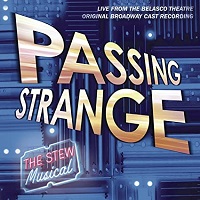
 (4 / 5) Passing Strange is the semi-autobiographical work of singer/songwriter Stew, co-written with his longtime collaborator Heidi Rodewald. The story follows Youth, a young black man played by an explosive Daniel Breaker. Anxious to be an artist and eager to search for what’s real in the world, Youth leaves behind his life of comfort in a California suburb for the exoticism of Europe. In doing so, he ends up cutting ties with everyone in his life — including his loving if not completely understanding mother, a role sung with warmth by Eisa Davis. On stage, Passing Strange was a highly energetic experience for audiences, but also a divisive one. This cast album, recorded live at the Belasco Theatre where the show played, will most likely prove divisive as well. First time listeners may be confused: There is very little dialogue between songs, leaving major gaps in the plot, and the method of the storytelling constantly changes so that characters either sing to each other, about each other, or from the point of view of the Narrator (played by Stew), often within the same song. However, to dismiss Passing Strange because of its non-traditional structure and its difficulty to categorize would be to ignore everything else that the show and this album have to offer. Stew and Rodewald’s music, which they also orchestrated, pulsates with creativity and spirit, whether permeating the air with soothing, lilting ballads such as“Keys (Marianna)” and “Come Down Now” or working up a sweat in “Keys (It’s Alright)” and “Mom Song.” As for Stew’s lyrics, they are artfully crafted while also conveying real emotion and conflict. Before the Broadway production of Passing Strange closed, Spike Lee filmed it; that film can be sought out by anyone who would like a more comprehensive understanding of the piece, and it also allows a greater appreciation of the work of the phenomenal cast. But even on stage, Passing Strange was less concerned with the details of its story than with the emotional potency of its journey. Perhaps if neophytes approached the recording as more of a pop/rock concept album, like Tommy or Jesus Christ Superstar, they’d have a clearer idea of what to expect from this highly creative work. — Matt Koplik
(4 / 5) Passing Strange is the semi-autobiographical work of singer/songwriter Stew, co-written with his longtime collaborator Heidi Rodewald. The story follows Youth, a young black man played by an explosive Daniel Breaker. Anxious to be an artist and eager to search for what’s real in the world, Youth leaves behind his life of comfort in a California suburb for the exoticism of Europe. In doing so, he ends up cutting ties with everyone in his life — including his loving if not completely understanding mother, a role sung with warmth by Eisa Davis. On stage, Passing Strange was a highly energetic experience for audiences, but also a divisive one. This cast album, recorded live at the Belasco Theatre where the show played, will most likely prove divisive as well. First time listeners may be confused: There is very little dialogue between songs, leaving major gaps in the plot, and the method of the storytelling constantly changes so that characters either sing to each other, about each other, or from the point of view of the Narrator (played by Stew), often within the same song. However, to dismiss Passing Strange because of its non-traditional structure and its difficulty to categorize would be to ignore everything else that the show and this album have to offer. Stew and Rodewald’s music, which they also orchestrated, pulsates with creativity and spirit, whether permeating the air with soothing, lilting ballads such as“Keys (Marianna)” and “Come Down Now” or working up a sweat in “Keys (It’s Alright)” and “Mom Song.” As for Stew’s lyrics, they are artfully crafted while also conveying real emotion and conflict. Before the Broadway production of Passing Strange closed, Spike Lee filmed it; that film can be sought out by anyone who would like a more comprehensive understanding of the piece, and it also allows a greater appreciation of the work of the phenomenal cast. But even on stage, Passing Strange was less concerned with the details of its story than with the emotional potency of its journey. Perhaps if neophytes approached the recording as more of a pop/rock concept album, like Tommy or Jesus Christ Superstar, they’d have a clearer idea of what to expect from this highly creative work. — Matt Koplik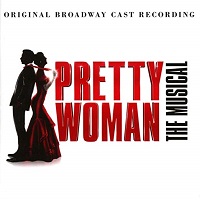
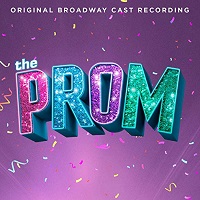
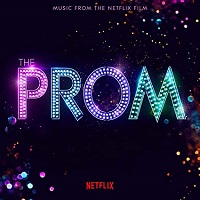
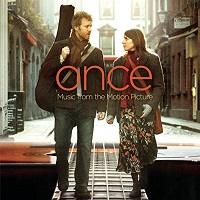
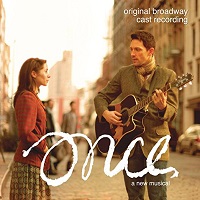
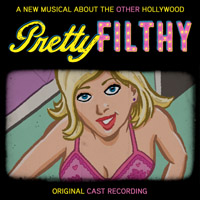
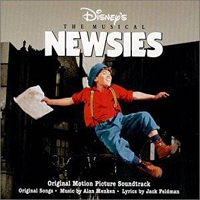
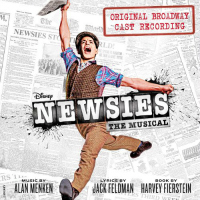
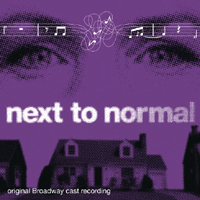
 (5 / 5) If Spring Awakening marked the successful comeback of the original pop/rock musical theater score, then Next to Normal helped insure its future. Part of the reason for the show’s success is that, despite its vibrant energy, it’s a very intimate piece that wears its large heart earnestly on its sleeve. The musical tells of the inner turmoil of a suburban family due to the mental instability of the mother, Diana, who has struggled with bipolar disorder ever since a traumatizing event years earlier: Her son, Gabe, whom she still imagines to be present, died when he was a baby. Although the plot at times borders on being that of a Lifetime Movie, the smart, pulsating score, given a crisp representation on this recording, keeps Next to Normal fresh and inventive. Brian Yorkey’s lyrics are strong and well defined, often bringing a touch of humor to cut the tension in the plot (for example, “My Psychopharmacologist and I”). Tom Kitt composed a score with both fire (“You Don’t Know,” “Didn’t I See This Movie”) and sweet sadness (“I Miss the Mountains”) that he orchestrated excellently with Michael Starobin, making the work electric yet still inherently theatrical. The cast, on the whole, is excellent. Alice Ripley tears into the role of Diana with an abandon that’s fearless, thrilling and at times unnerving. Occasionally, the performer seems so at one with the part that you might fear she won’t even make it to the end of the number — but she always does. J. Robert Spencer is very moving as the silently suffering husband, Dan, and so is Jennifer Damiano as daughter Natalie. Because of the surprises in the plot, listeners who haven’t seen the show will find it especially important to read the synopsis included in the CD booklet in order to make full sense of the story and songs such as “I’m Alive” and “There’s a World,” both sung by Gabe (Aaron Tveit). But they’ll have no problem understanding the emotional potency of each song. — Matt Koplik
(5 / 5) If Spring Awakening marked the successful comeback of the original pop/rock musical theater score, then Next to Normal helped insure its future. Part of the reason for the show’s success is that, despite its vibrant energy, it’s a very intimate piece that wears its large heart earnestly on its sleeve. The musical tells of the inner turmoil of a suburban family due to the mental instability of the mother, Diana, who has struggled with bipolar disorder ever since a traumatizing event years earlier: Her son, Gabe, whom she still imagines to be present, died when he was a baby. Although the plot at times borders on being that of a Lifetime Movie, the smart, pulsating score, given a crisp representation on this recording, keeps Next to Normal fresh and inventive. Brian Yorkey’s lyrics are strong and well defined, often bringing a touch of humor to cut the tension in the plot (for example, “My Psychopharmacologist and I”). Tom Kitt composed a score with both fire (“You Don’t Know,” “Didn’t I See This Movie”) and sweet sadness (“I Miss the Mountains”) that he orchestrated excellently with Michael Starobin, making the work electric yet still inherently theatrical. The cast, on the whole, is excellent. Alice Ripley tears into the role of Diana with an abandon that’s fearless, thrilling and at times unnerving. Occasionally, the performer seems so at one with the part that you might fear she won’t even make it to the end of the number — but she always does. J. Robert Spencer is very moving as the silently suffering husband, Dan, and so is Jennifer Damiano as daughter Natalie. Because of the surprises in the plot, listeners who haven’t seen the show will find it especially important to read the synopsis included in the CD booklet in order to make full sense of the story and songs such as “I’m Alive” and “There’s a World,” both sung by Gabe (Aaron Tveit). But they’ll have no problem understanding the emotional potency of each song. — Matt Koplik
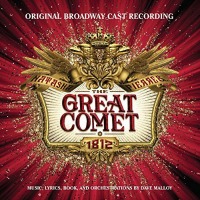

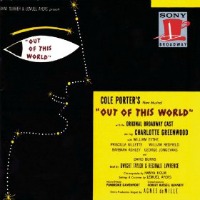
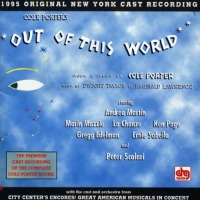
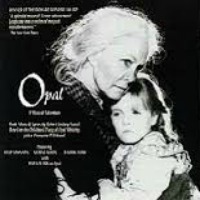
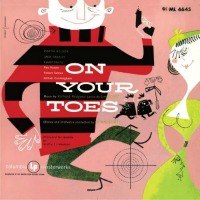
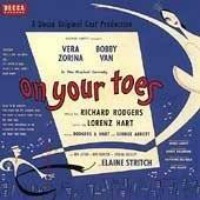
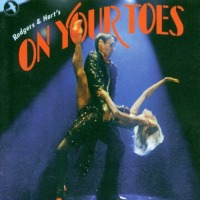
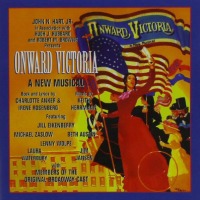
 (1 / 5) Although the subject was ripe and the characters were fascinating, Onward Victoria was a one-performance disaster that nonetheless yielded a cast album. The story, by librettists-lyricists Charlotte Anker and Irene Rosenberg, centers on the 19th-century feminist Victoria Woodhull and her adventures in New York with Elizabeth Cady Stanton, Henry Ward Beecher, and other notables. The show’s stirring themes include religious hypocrisy and women’s rights, but the characters tend to sing about these issues in shallow polemics (“Revolution’s in the air like an impending storm”), and Keith Herrmann’s music, while generally constructed as a traditional musical theater score, is styled mostly as soft rock. Jill Eikenberry is a thin-voiced Victoria, and Michael Zaslow is treble-y as Beecher, but Lenny Wolpe has one good moment in “Unescorted Women.” By the time Victoria is defending the good reverend on the witness stand with the striptease-like “A Valentine for Beecher,” in which she sings about how “well-endowed” he is, credibility and good taste have gone out the window. — Marc Miller
(1 / 5) Although the subject was ripe and the characters were fascinating, Onward Victoria was a one-performance disaster that nonetheless yielded a cast album. The story, by librettists-lyricists Charlotte Anker and Irene Rosenberg, centers on the 19th-century feminist Victoria Woodhull and her adventures in New York with Elizabeth Cady Stanton, Henry Ward Beecher, and other notables. The show’s stirring themes include religious hypocrisy and women’s rights, but the characters tend to sing about these issues in shallow polemics (“Revolution’s in the air like an impending storm”), and Keith Herrmann’s music, while generally constructed as a traditional musical theater score, is styled mostly as soft rock. Jill Eikenberry is a thin-voiced Victoria, and Michael Zaslow is treble-y as Beecher, but Lenny Wolpe has one good moment in “Unescorted Women.” By the time Victoria is defending the good reverend on the witness stand with the striptease-like “A Valentine for Beecher,” in which she sings about how “well-endowed” he is, credibility and good taste have gone out the window. — Marc Miller